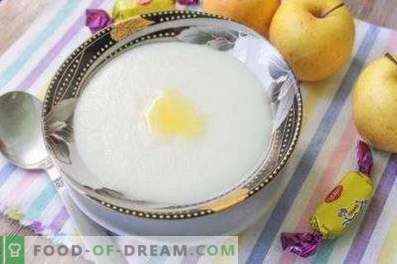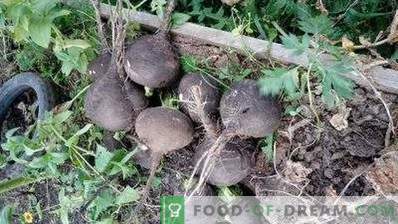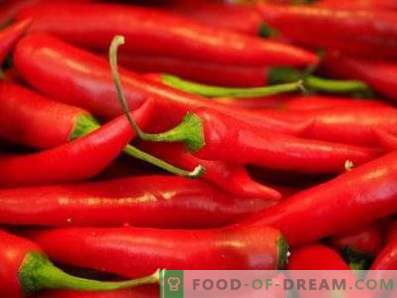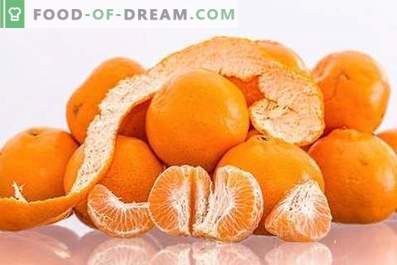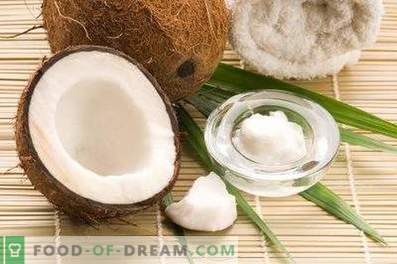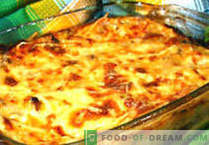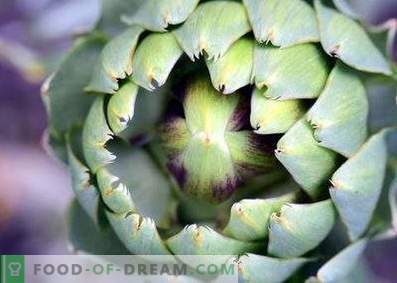
The artichoke, or cinara, is the flower of the Aster family. The plant’s homeland is the Mediterranean and the Canary Islands, where it can still be found in the wild. Today, this culture is grown everywhere. However, the largest artichoke plantations are located in the USA, Italy, France and Spain.
There are over 140 varieties of artichoke. However, no more than 40 of them can be eaten. Cynara cardunculus (Spanish artichoke, cardon) and Cynara scolymus (French artichoke) are the most common ones on sale.
For culinary purposes, they use the core of the inflorescence, receptacle and fleshy bases of scaly leaflets of cynar. They are eaten raw, blanched, boiled, pickled and fried. Very often the artichoke is added to salads, bakery fillings and vegetable sauces. All parts of the plant are used for medicinal purposes.
Botanical description
Cinar is a herbaceous plant with a fleshy taproot. Straight weakly artichoke stem can reach 210 cm in height. The elongated pinnacle leaves of the culture form a dense rosette. Greenish-gray or bright green leafy plates are pubescent below.
The artichoke blooms with purple or bright blue flowers, collected in large (up to 120 mm in diameter) baskets at the top of the stem. The spherical wrapping of the inflorescence consists of a set of fleshy greenish-gray or green leaves, thickened at the base and pointed at the end. The fruit of the plant is a large quadrangular or flattened achene.
Artichoke Nutritional Value
Artichoke is a rich source of nutrients. 100 g of this product contains:
- 1, 114 g of proteins;
- 0, 093 g of fat;
- 5, 834 g of carbohydrates;
- 0, 447 g of dietary fiber;
- 89, 909 g of water;
- 0, 922 g of ash;
- 0, 089 g of organic acids.
Digestible carbohydrates in cinara - sugars (4, 949 g per 100 g), starch and dextrins (0, 438 g per 100 g).
Vitamins in the artichoke
When eating 100 g of artichokes that have not undergone cooking, the following vitamins are ingested:
- retinol equivalent, A - 19, 618 mkg;
- thiamine, B1 - 0, 039 mg;
- riboflavin, B2 - 0, 044 mg;
- pantothenate, B5 - 0, 338 mg;
- pyridoxine, B6 - 0, 195 mg;
- folates, B9 - 18, 477 mkg;
- ascorbic acid, C - 4, 923 mg;
- alpha tocopherol, E - 0, 187 mg;
- phylloquinone, K - 14, 784 mcg;
- Niacin equivalent, PP - 0, 798 mg.
Also in the composition of the product there are such vitamin-like substances as choline (B4, 34, 347 mg per 100 g) and betaine trimethylglycine (0, 196 mg per 100 g).
Useful items
Trace elements in 100 g of artichokes:
- aluminum - 814,668 µg;
- fluorine - 13, 124 mcg;
- manganese - 0, 206 mg;
- iodine - 1, 899 mkg;
- boron - 99, 617 mcg;
- molybdenum - 9, 407 mkg;
- cobalt - 0, 988 mkg;
- zinc - 0, 281 mg;
- copper - 134, 811 mkg;
- iron - 0, 387 mg.
Macroelements per 100 g of product:
- potassium - 237, 704 mg;
- sulfur - 14, 809 mg;
- calcium - 14, 931 mg;
- chlorine - 46, 211 mg;
- magnesium - 8, 033 mg;
- phosphorus - 33, 772 mg;
- Sodium - 19, 733 mg.
Artichoke Calories
The energy value of 100 g of raw artichokes - 46, 808 kcal, fried in vegetable oil - 97, 016 kcal. In a similar portion of the blanched product contains 47, 014 kcal. Caloric content of 100 g of boiled artichokes - 44, 214 kcal, pickled - 49, 314 kcal.
Artichoke Selection and Storage Rules
Quality artichokes have a green or greenish-purple color. Experienced chefs prefer elastic, fleshy and heavy buds with tightly scaled leaflets. The color of the product can vary from green to greenish-purple. The size of the buds does not matter.
Fresh artichokes can be stored in a refrigerator at a temperature of 0 to + 1 ° C for no more than 6 days. It is better to pour buds into tight-fitting plastic or glass containers. You cannot keep strong-smelling foods, ready-made meat or vegetable dishes, spoiled vegetables or fruits near artichokes.
Use of Artichokes
- The artichoke is a storehouse of useful micro- and macroelements, vitamins. Regular consumption of dishes prepared from this vegetable, allows you to replenish stocks of nutrients in the body.
- In alternative medicine, artichoke decoction is used as a means of stimulating appetite.
- Cinara has diuretic and choleretic properties. This product is useful for people suffering from severe edema, diseases of the urinary system, gall bladder and ducts.
- Artichoke is an effective diaphoretic.
- As part of this vegetable there are compounds that alleviate rheumatic pains.
- Artichoke broth is taken orally instead of tea for gastroenterological diseases that have developed amid a sharp increase in the acidity of gastric juice. In alternative medicine, this tool is used to treat severe heartburn.
- Tsinara contains a complex of substances that have a healing effect on the nervous system. People who include it in the diet at least once a week, less often fall into depression, easily tolerate psycho-emotional upheavals and stresses, sleep well.
- The artichoke helps to eliminate poisons and toxins from the body, accelerates recovery from poisoning with stale or poor-quality food, alcohol.
- The vegetable contains substances that neutralize or minimize the negative effects of drugs on the liver.
- Tsinara is an effective remedy for toxemia during pregnancy.
- Dishes with artichoke help to eliminate the fetid odor from halitosis.
- With juice or saturated decoction, tsinaras rinse the oral cavity during stomatitis, gingivitis and other dental diseases, accompanied by the development of inflammatory processes.
- Vegetable juice is rubbed into the scalp for pathological hair loss. The procedure is carried out at least 8 times a month.
- Artichoke contains cinaroside and luteolin - compounds that reduce the concentration of harmful cholesterol in the blood, preventing the formation of atherosclerotic plaques in blood vessels. Other nutrients that are present in this product strengthen the myocardium, correct the heart rate, give strength, firmness and elasticity to the vessels. With regular consumption of vegetables significantly reduces the risk of developing heart disease.
- In folk medicine, tsinara is used to treat psoriasis, eczema, and other skin diseases. Plant material (25 g) is boiled for 10 minutes in water (500 ml), drawn for 2 hours and the liquid is filtered off. The resulting tool wipe the affected skin up to 10 times a day.
- Artichoke is used in the treatment of thrush in women. Fresh buds (3-4 pieces) boil in a liter of water for 25 minutes, cool and filter the resulting liquid. The broth is used for douching and cooking local baths.
- Water infusion of artichoke buds helps stop long-lasting vomiting.
- Tsinara is useful for people who have undergone surgery on the kidneys and liver. The product speeds up the recovery process after surgical interventions, helps to minimize the risk of complications.
- Artichoke broth has analgesic properties.
- Dishes from tsinara have a positive effect on the functioning of the hematopoietic system. Therefore, they are recommended for people suffering from anemia.
- Artichoke can accelerate metabolic processes in the body.
- The product is rich in compounds that normalize the functioning of the thyroid gland.
- Vitamin A and other nutrients present in cynar strengthen the visual apparatus, increase visual acuity, and help minimize the risk of developing ophthalmic diseases.
- Artichoke has aphrodisiac properties. Dishes from this vegetable increase the sexual desire in men, normalize the work of the reproductive system, increase the likelihood of conception.
- Tsinara contains a complex of nutrients having antioxidant properties. With regular consumption of this vegetable in food, wear and aging of body tissues are slowed down, appearance and condition of the skin are improved.
Contraindications and harm of artichokes
- Cinara can provoke the development of food allergies.
- Dishes from this vegetable are contraindicated in case of gastroenterological diseases that develop along with a decrease in the acidity of gastric juice.
- Artichoke is harmful with low blood pressure (hypotension).
- Tsinara is contraindicated in people who have been diagnosed with cicatricial narrowing of the biliary tract.
- The artichoke is forbidden to eat in case of severe dystrophic changes in the liver tissue.
- Women breastfeeding are advised to temporarily exclude tsinara from the diet. It is proved that the compounds contained in this vegetable, reduce the production of breast milk.
- Artichoke is contraindicated for people suffering from gallstone or urolithiasis.
- Brown buds are unfit for human consumption.
- Abuse of artichokes can cause diarrhea, flatulence, bloating, and heaviness in the stomach.
- Nutritionists do not recommend giving tsinara to children under 6 years old.

